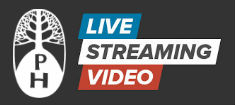Pricing:
Basic Fee - $100
Fee Plus - $115
Subsidized Fee - $85
If you are seeking financial assistance to participate in this program, please click on the link below for our Financial Assistance Application form. Do NOT register online.
Image detail: "Life and Dreams of the Perla Ravine" ("Vida y Sueños de la Cañada Perla"), originally by Sergio Valdez and community members in 1998. Repainted on the U.S. border wall in Nogales, Mexico in 2005 by Alberto Morackis, Guadelupe Serrano, and community members. Photo: Mary Watkins.


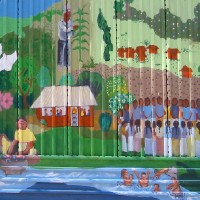
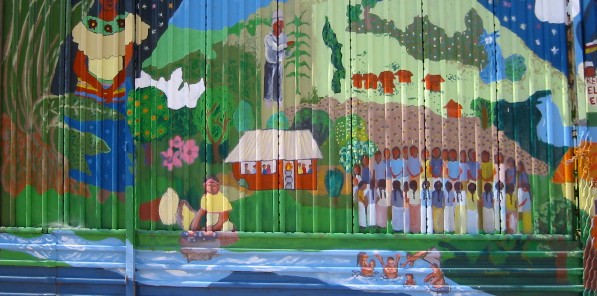
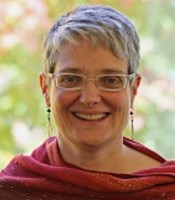 Lucy Duncan serves as Director of Friends Relations for AFSC. She blogs, writes, organizes Quakers to work for justice, and has helped formulate and develop AFSC’s focus on accompaniment as an elemental social justice and spiritual practice including through the adaptation of Quaker social change ministry in which allies center the leadership and voice of those most impacted by injustice. She has been a storyteller for 20 years and has worked with Quaker meetings on telling stories for racial justice and of spiritual experience. Before working for AFSC, she was Director of Communications at FGC, managed QuakerBooks of FGC, owned and managed her own children’s bookstore in Omaha, The Story Monkey, and was a member of a storytelling troupe, The Five Bright Chicks. She is a member of Green Street Friends Meeting (PhYM) and is the proud mom of an 18 year-old son, Simon.
Lucy Duncan serves as Director of Friends Relations for AFSC. She blogs, writes, organizes Quakers to work for justice, and has helped formulate and develop AFSC’s focus on accompaniment as an elemental social justice and spiritual practice including through the adaptation of Quaker social change ministry in which allies center the leadership and voice of those most impacted by injustice. She has been a storyteller for 20 years and has worked with Quaker meetings on telling stories for racial justice and of spiritual experience. Before working for AFSC, she was Director of Communications at FGC, managed QuakerBooks of FGC, owned and managed her own children’s bookstore in Omaha, The Story Monkey, and was a member of a storytelling troupe, The Five Bright Chicks. She is a member of Green Street Friends Meeting (PhYM) and is the proud mom of an 18 year-old son, Simon.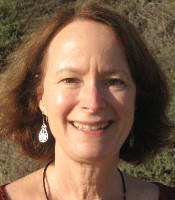 Mary Watkins, Ph.D., is a liberation psychologist, Chair of the Depth Psychology MA/PhD Program at Pacifica Graduate Institute, and co-founder and co-chair of its specialization in Community, Liberation, Indigenous, and Eco-Psychologies. She is currently committed to the accompaniment of asylum seekers in detention and to education inside prisons. She is the author of Mutual Accompaniment and the Creation of the Commons, Waking Dreams, and Imaginal Guests: The Development of Imaginal Dialogues; and co-author of Up Against the Wall: Re-Imagining the US-Mexico Border,
Mary Watkins, Ph.D., is a liberation psychologist, Chair of the Depth Psychology MA/PhD Program at Pacifica Graduate Institute, and co-founder and co-chair of its specialization in Community, Liberation, Indigenous, and Eco-Psychologies. She is currently committed to the accompaniment of asylum seekers in detention and to education inside prisons. She is the author of Mutual Accompaniment and the Creation of the Commons, Waking Dreams, and Imaginal Guests: The Development of Imaginal Dialogues; and co-author of Up Against the Wall: Re-Imagining the US-Mexico Border,  Anyango R. Gregory was born in Washington, DC to an African American mother and a Kenyan father. Her parents were both teachers in several DC public schools and actively involved in the Civil Rights movement and the struggle for independence across the African continent. Anyango’s family moved to Kenya during her early infancy. She is a proud product of the Kenya public school system where she completed her elementary and high school education. In 1993, she returned to the United States to pursue a BA in Psychology from Eastern University with a concentration in cross-cultural communications; an MA in International Affairs and Development with a focus on social change from Clark Atlanta University; and a Ph.D. in African Studies and Research from Howard University with an emphasis on conflict management.
Anyango R. Gregory was born in Washington, DC to an African American mother and a Kenyan father. Her parents were both teachers in several DC public schools and actively involved in the Civil Rights movement and the struggle for independence across the African continent. Anyango’s family moved to Kenya during her early infancy. She is a proud product of the Kenya public school system where she completed her elementary and high school education. In 1993, she returned to the United States to pursue a BA in Psychology from Eastern University with a concentration in cross-cultural communications; an MA in International Affairs and Development with a focus on social change from Clark Atlanta University; and a Ph.D. in African Studies and Research from Howard University with an emphasis on conflict management.